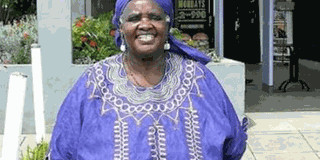Tribute to the queen of words

Wanjiku Matenjwa the founder of AMKA forum for Women’s Literature, who died on May 15, 2020. PHOTO | POOL | NATION MEDIA GROUP
As a child of AMKA forum for Women’s Literature, which Wanjiku Matenjwa co-founded in 1997, I felt a deep sense of loss when I learnt of her death. Our interactions in the last 12 years of my association with the forum had, however, been sporadic until June 2019, when we had the first (and last) hearty conversation.
Before this, she had emailed me about an article I wrote, lauding me for highlighting the plight of the boy child.
“We seem to have heeded the call to empower the boy child as well,” she said.
From our brief interactions at AMKA before, I knew she was not a woman shy of speaking her mind. Little wonder then that she created a space where women could do exactly that by amplifying their voices through writing.
I broke my literary virginity at AMKA, having been one of the featured writers in a 2012 anthology titled Fresh Paint, published by AMKA in collaboration with the Goethe Institut.
The Institut also hosted the monthly AMKA literary forums and on the day I spoke at length to Wanjiku, I had guest-moderated a session where her former students at Kenyatta University, Wangari Mwangi, performed one of the poems she penned titled, Today I’m Name Dropping, much to Wanjiku’s delight.
“You did my poem justice,” said Wanjiku later. Her smile did not leave her face for the remainder of the sessions.
Here’s a snippet of a few lines from the poem:
What is your name woman? / What-is-your-name!! WOMAN!!/ MADAM MADDAME WHAT-IS-YOUR-NAME? / Today Sir my name is Esther Passaris. /And Fatma Gedi. /YOU-STUPID-WOMAN I ASKED YOU WHAT IS YOUR YOUR NAME!!!!???/ I am sorry sir/Today my name is/D-O-C-T-O-R S-T-E-L-L-A N-Y-A-N-Z-I./ Doctor Stella Nyanzi sir. /Today my name sir is/ DR IVY WANGECHI/These @#$#&^/ women who don't listen to instructions- I asked you Maddame what is your name? /Simple/Oh sorry sir. /Really sorry sir/My name is Alaa Salaah/What is wrong with this woman? /Is your head sitting properly?
In many ways, the poem defined the Wanjiku I ‘met’ that day in June: Defiant, loud, passionate, outspoken, humourous and cheeky with a larger than life personality. The lines offered glimpses of her personality that I had never been privy to and we (Wangari, Wanjiku and I), spent the better part of the afternoon giggling like little girls and talking about literature, music and dancing.
“Do you remember what else we talked about?” I asked Wangari later, but neither of us could. All we remembered was the laughter.
But Wanjiku also expressed some concerns about AMKA. About whether the sanctity of the space — which is meant to nurture women’s writing, was still being maintained. I did not feel equipped to contribute, having been an unfaithful attendee for years, but she then switched to the beginnings, spinning such a spell-binding tale about the origins of the space for women that I told her:
“We need to tell this AMKA story properly. It’s fascinating!”
But I did not keep my word. My procrastination cost me a great story.
MP Yusuf Haji, in a condolence message posted on his Twitter account, remembered Wanjiku as a gallant activist in the struggle for change in Kenya, adding that she comes from a long line of heroines like the late Dr Wanjiru Kihoro and Muthoni Matenjwa. I only learnt of this upon her death, and wished I had known before, so I could prod her for the stories, for she was a gifted narrator.
Later, in reading her eulogy, I discovered we were both alumnae of St Brigid's Girls High School Kiminini, which she attended between 1968 and 1971. We would have had much to talk about.
I may not have kept my word about telling her story, but it remains immortalised in her poetry, in the space for women she founded, in the books she wrote and the ones she edited. Wanjiku passed away on May 15, and was buried on May 22. May she rest in power.




